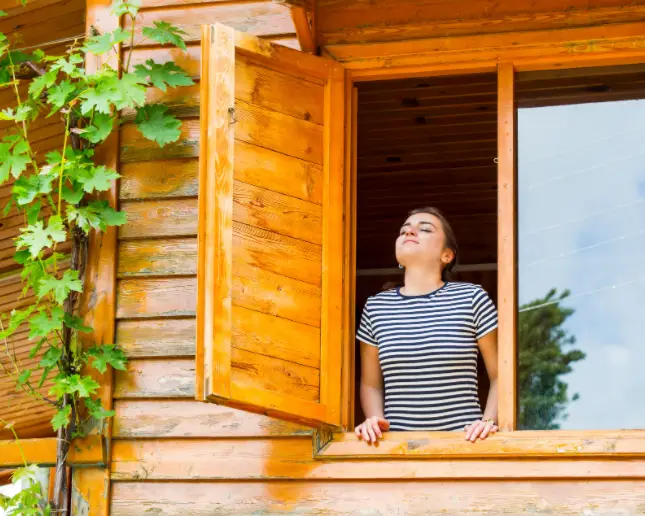
Exactly how much air do we breathe per day? You might be wondering about this question if you’re interested in maintaining fresh air indoors. On average, we all inhale about 11,000 liters of air daily, which is equivalent to 7 to 8 liters per minute.
Now, think about how much of that air is clean and how much is polluted – our health can be in danger if we inhale too much pollution. If you’re already suffering from respiratory problems or if your allergy and asthma are getting worse, that’s most likely a sign that you need to inhale fresh air.
We care about your health and we want you to be able to breathe fresh air as much as possible. A way to make your air fresh is to have a device to clean air in the home, such as an air purifier. Aside from that, regular cleaning will help to keep pollution at bay.
How much fresh air does a person need?
To maintain fresh and healthy air, for every 600 to 900 square feet of room, we need about 100 cfm (cubic feet per minute). That number is a general estimate for a residential home. With that said, it’s not a fixed number and could also change depending on the following factors:
- Presence of doors and windows
- Other ventilation areas around the house
- Existing furniture (that might block airflow)
- Outdoor weather (which can change wind flow)
This requirement of fresh air is one of the common answers to the question “why get an air purifier?”. Fresh air will help you stay healthy against various health concerns. If you have allergies or asthma, breathing healthy and fresh air will lessen your symptoms.
Why getting fresh air is so good for you?
So, why do we need fresh air? Whether it’s stepping out in nature or staying indoors and using an air-cleaning device such as an air purifier breathing fresh air proves to have various health benefits. Here reasons why you need to get fresh air:
- Fresh air improves our lung health. If we breathe fresh air, we’ll have a balanced respiratory system because we’re left with fewer harsh chemicals to breathe. This means that our lungs will work more properly and the gas exchange between carbon dioxide and oxygen will have a more normal pace.
- It lessens allergy and asthma symptoms. Most people wonder: “do air purifiers improve health?” in which allergy experts say “yes” because of their ability to create fresh air within a closed space. This fresh air is free of allergens that would trigger asthma attacks and bouts of sneezing if you have hay fever or allergic rhinitis.
- Fresh air benefits hypertensive people. If you or your folks at home are hypertensive or have problems with blood pressure, having fresh air will be helpful. That’s because blood pressure is regulated better with sufficient oxygen in the air. If your air becomes stale due to being in an airtight home, you’ll only breathe less oxygen.
Whether or not you have an A/C unit at home, you’ll still need to open up the windows from time to time to enable oxygen to cycle properly indoors. With more oxygen in the air, your heart rate and blood pressure won’t go haywire.
- Oxygen therapy helps injured people. Did you know that breathing fresh air can also help you recover from injuries faster? Think about why people who are sent to emergency rooms in hospitals are given oxygen as first aid – it’s the same principle.
The way this happens is that each cell in the body will heal faster if they have sufficient oxygen. Therefore, if you’ve been sick or a little under the weather, fresh air will help you recover.
- You’ll digest food better. When we spend our time on the desk and multitasking between food and work (or school work), our digestive system suffers if we aren’t taking a lot of oxygen. To digest food properly, you’ll need more oxygen, which comes from fresh air.
Does a house need to breathe?
Yes, a house with proper ventilation is helpful for human health. With a working air circulation, a house with proper ventilation will quickly disperse dirty air and take in clean air. If your house is poorly ventilated it could trap various harsh pollutants, such as dust and harmful gases, which we will eventually inhale.
While the gases are small at first, if they accumulate in our lungs, we’re bound for certain respiratory problems in the future. That’s why it’s important to have a house that’s aired out.
Moreover, if you clean a house that doesn’t have a lot of open doors, windows, or any form of ventilation, getting dust mites out is also a challenge. Think about when you shake your bed sheets – you’re only trapping the dust mites in your home if your windows are closed.
Are air-tight homes healthy?
Unfortunately, airtight homes aren’t exactly the healthiest. Asthma and other respiratory problems are more likely to occur because you’re trapped within an airtight space full of allergens that cannot get out of the house.
Without a proper room ventilation system, all of the dust, pet dander, smoke, and other small pollutants that are trapped in the house will stay there – and you will inhale them. This makes you more exposed to such pollutants.
Instead of making your home entirely airtight, it’s better to open the doors and windows once in a while to help circulate the air much better. After all, air purifiers and other cleaning devices work better with proper house ventilation.
Conclusion
To wrap it up, we all breathe a lot of air every single day, but the question lies whether we breathe fresh or polluted air – and how much pollution we breathe contrary to healthy air. If we become aware of the air we breathe at home, we’ll save ourselves (and our loved ones) from respiratory problems, as well as bouts of allergy and asthma symptoms.


